Hi visitor!
Wednesday, December 31, 2008
Monday, December 29, 2008
Nationalism in shirts

I have been noticing for sometime now the emergence of t-shirts with nationalistic designs. Shirts with the 8-rayed sun and three stars, representations of the Philippine flag, and even artistic portraits of national heroes.
When we went to attend a wedding in Jala-jala, Rizal last Saturday, we passed through Tanay town to change rides (I do not know of any direct rides from Metro Manila to Jala-jala). On our way home, we took some time to visit the local tiangge for some post-Christmas shopping. I can't help but notice the various displays of shirts with sun and star designs. Some even have "I'm proud to be Pinoy" in-scripted in the front of the shirt.
So I thought, is this a drive to raise the nationalistic spirit of the Filipino or is this a post Manny Pacquiao-Oscar dela Hoya sale? I got a chance to peek at one of the shirts with what looks like Manny Pacquiao printed on it with a "Kaya ng Pinoy" superimposed on the lower part of the image.
Whether it is for Manny or for the country in general, these shirts are coming out everywhere. I am guessing that one of these days, these shirt designs will have a new addition on them. The face of a presidential candidate now that the 2010 presidential election looms in the horizon.
Friday, December 26, 2008
Merry Christmas
Friday, December 5, 2008
System loss charge
This post is in no way is being used against Meralco, Ms. Santos, or the ad agency. It merely analyzes the presentation of their point regarding system loss.
Here's how I see this production and expense happens. Electricity is produced by the power plants. They spend for that production and sell it to distributors. Distributors like Meralco pay the marked up value of the power and sells it to users. Users then pay for the marked up cost of electricity.
In the commercial, Judy Ann explains that system loss is similar to ice losing its solidity. If you purchase a bag of ice from a store and carry it home, some get lost as it melts. They say that in the same manner, system loss is the weakening of the strength of purchased electricity as it is transmitted from the independent power producers to your home.
After some thought, I realized that they missed something in the commercial.
The melting ice is paid for and turns to liquid after the purchase during the transit from store to home. And the buyer pays for this loss in terms of reduced coldness. The loss is that of the buyer and not of the vendor since the merchandise has been paid for.
Now, if you relate this to electrical consumption, system loss is not the loss of the user but the distributor or power producer.
I think they should come up with a better presentation.
Monday, December 1, 2008
Latin prayer
On our way out, I wondered, did anybody else understand that closing prayer? I think not.
My grandmother prays in Latin during prayer evening when we were young. Of course she understood what she was praying (I assumed), but our generation (at least for mine and my siblings' part) we never did.
So why do priests these days pray Latin when they should know that not all the churchgoers understand any word they say? Is it to impress us that they know Latin? Or is Latin the only language understood in heaven?
All priests learn Latin while in the seminary. I know because I once was to be a seminarian. Unfortunately, the presence of beautiful girls in the seminary ground during family Sundays is nothing compared to the presence of beautiful girls in UP High School in Iloilo everyday. So I gave up my dream to become a priest by foregoing my slot in St. Vincent's Seminary.
After all the years in the seminary, seminarians, or the priests themselves, become well versed in Latin. It is the language used in writings from Rome after all. To better comprehend books in priesthood, seminarians need to learn the language used in writing those books.
But I doubt that Latin is the official language in heaven. Jesus, after all, spoke Aramaic growing up.
On another note, why else would God make the Apostles speak in tongues when Latin is the official language in heaven?
You see, the events following the construction of the Tower of Babel made possible the differing languages of man. Man tried to build a tower that will reach to the heavens so they can be in the same level as God. Angry at man for being too ambitious, God made man speak in tongues and the 'language barrier' ensured the failure of the construction of the Tower of Babel.
So, by giving the Apostles capacity to speak in the language of other men, God made it easier to spread his word amongst peoples. This, to me, proves that we need not pray in Latin to be heard by God.
In closing, I suggest that Roman Catholic priests save the Latin prayers for high mass and speak the language understood by the least educated churchgoer during Sunday celebrations.
Sunday, November 2, 2008
Benefits of hand washing
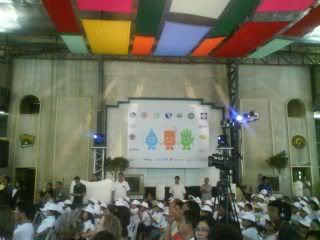
Present during the event were representatives from the UNICEF and the Departments of Health and Education.
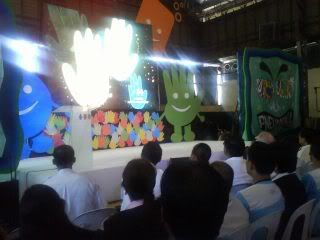
The education agency was represented by no other than its Secretary, Honorable Datu Dr. Jesli A. Lapus.
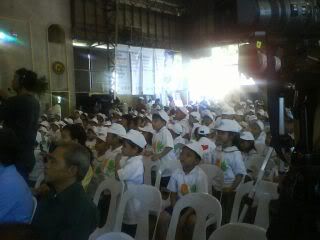
Kids from the Fort Bonifacio Elementary School were taught how to properly wash their hands. It is said that hand washing can effectively prevent the occurrence of the five most common diseases that cause children to miss school.
A healthy child is a happy child. A healthy child is always in school. A happy child enjoys learning.
Sunday, October 19, 2008
It goes around
A few days ago, I have read in a local paper that the bill is gaining popular support from various groups including some religious ones. Later on, I have read that some government leaders are unwilling to support the bill.
Today, I realized that this is what will happen to the issue:
there is a pattern to this particular issue.
1. The members of Congress comes up with a plan to help solve national concerns, in this case the reproductive health bill as a way to help manage population growth.
2. Organizations begin to oppose the plan (e.g. saying that the bill is anti-life).
3. The plan (or the bill) gets shelved. As an effect of the shelving of the RH bill, people, mindless of what they do, continue to contribute to the growing number of Filipinos.
4. Since most of those who have more than enough children seem to come from middle to lower income groups, these kids and their families need to rely on government support for education, health, and employment.
5. Now enter the organizations. They implement programs to help the above-mentioned families have decent education, health care, and employment.
6. As the population continuously grow, both the government and the organizations get their hands full.
7. The organizations begin to blame the government for lack of support.
8. The government once again thinks of ways to solve the problem and comes up with a plan.
9. Continued on item number 2.
I think this cycle can be applied to almost all problems and solutions faced by governments worldwide.
I do not say we let the government just implement anything they want to do.
As a person, we should have a deeper understanding of the issues and see further than what is shoved in our faces. We may lack the capacity to do it but we can start by discussing those concerns that affect our lives. And we should discuss them with open minds, weighing each side, and coming up with informed decisions.
If we can come up with unique names for our kids, why can't we form our own opinions?
If you just go with what is the popular decision then you are like a lemming - you jump off the cliff because that is what everybody is doing.
Wednesday, October 8, 2008
Education News - Chinese lessons
Public school students say Ni Hao Ma!
Filipino students may soon have access to free Mandarin lessons – one of the most widely-spoken languages of business.
Members of the Federation of Filipino-Chinese Chambers of Commerce and Industries Incorporated (FFCCCI) and representatives from the Chinese Ministry of Education (MOE) recently visited the Department of Education to propose teaching Mandarin in public schools.
The Volunteer Program for International Chinese Teachers managed by the MOE’s Office of Chinese Language Council International will send language instructors every year to the Philippines.
“We may offer it (language class) as an elective in high performing schools,” Lapus said. “This will help broaden our children’s understanding of China and its culture.”
Other foreign languages taught in schools today are Spanish and French. English, on the other hand, is being used as a medium of instruction and is one of the core subjects in basic education.
According to MOE representatives, they presently have over 100 Chinese-language teachers in Filipino-Chinese schools in the cities of Bacolod, Iloilo, Tarlac, Cebu, Davao, and Quezon. The delegation is set to provide DepEd with a complete list of their deployment in the country.
The language instruction is planned for implementation when public high schools open this June.
FFCCCII is a strong supporter of DepEd in improving the quality of education in the public school system. To date, FFCCCII has constructed 2,503 classrooms nationwide through DepEd’s Adopt-a-School Program.
China is a historical partner of the Philippines with deep social, economic and ethnic ties dating back to the 10th century.
END
Tuesday, September 16, 2008
NAIA 3
On my way to Cebu City last week, I came to see for the first time NAIA Terminal 3.
It is has a large check in area for Cebu Pacific and some Air Philippines flights.

 There are numerous check-in counters in the lobby of the domestic flights side that cater to the travelers of the two airlines.
There are numerous check-in counters in the lobby of the domestic flights side that cater to the travelers of the two airlines. Each side of the check-in area has guide lines for the passenger queue.
Each side of the check-in area has guide lines for the passenger queue. After traversing the queue and paying for your terminal fee, you are going to face the long walk to the farthest gate - which is the gate given to us bound for Cebu.
After traversing the queue and paying for your terminal fee, you are going to face the long walk to the farthest gate - which is the gate given to us bound for Cebu. There is, of course, a travelator for the passengers. The bad thing is that it only takes you through about 25 meters of the way to the farthest gate.
There is, of course, a travelator for the passengers. The bad thing is that it only takes you through about 25 meters of the way to the farthest gate. Fortunately for us, no ceiling collapsed at the time we were there. It collapsed on the day we were to return. :)
Fortunately for us, no ceiling collapsed at the time we were there. It collapsed on the day we were to return. :)
Thursday, August 14, 2008
Food problem: rice shortage
There were reports of hoarding by unscrupulous rice traders who wants to make a killing by keeping away tons of rice they bought at pre-increase cost and sell them when prices have doubled. Several of these greedy businessmen were discovered and punished accordingly.
I just hope that the televised surprise inspections and arrest are not just for show.
Other traders profit by saying that rice production is not nearly enough. If I remember my economics class in high school and college, the decrease in supply triggers a natural increase in cost.
During a recent trip to Baguio City, I was able to see the wide rice fields of Bulacan and Pampanga. this made me wonder, is there really a shortage?

The vast greens sprawling as the eyes can see makes one wonder - are we really short of supply?
Sure, last summer's drought and this season's typhoons damage crops and farmers lose millions but do we really consume that much rice? I for one can eat two service cups of rice. But sadly, others can't even finish half a cup.

I think our problem really is not the supply but rather the consumption. I believe there is no problem with consumption especially when the youngsters now are more concerned of their weight and their figure and prefer to have less rice in their diets.
People tend to buy more rice than they can eat. Merchants sell more rice than their customers can handle.
We do not have a deficit in rice supply but rather a surplus in wasted rice. By wasting rice, we rob those who need them more of the supply that they could have had.
Monday, August 11, 2008
Linux how NOT to: chmod mistakes
Last night, I tried to tinker with my PC running on Bayanihan Linux 4 developed by the Advanced Science and Technology Institute of the Department of Science and Technology of the Republic of the Philippines.
In my home directory, I have three folders kenni, lyn, and shared. The kenni folder is of course owned by me. The lyn folder is owned by my wife. And the shared folder I had for so long wanted to be shared by the both of us.
In Windows, when your drive is formated in FAT32 rather than NTFS, each and every user with an account in the PC can access the folders of other users with accounts in that same PC. This is eliminated by formating your drives in NTFS.
In Linux, drives are formated in ext3 (at least for this one I use since I don't really know if other distributions of Linux also use ext3). Each individual user of a Linux-powered PC with an account cannot access anybody else's folder. Unless of course you are the root administrator.
Back to my story, I was trying to make the shared directory accessible to me and my wife so I opened the Linux command list I compiled over the years. And here is what I typed on the terminal console:
$chmod 644 . shared
I was trying to make shared accessible to everyone. 6 means that the owner of the file or folder can read and write on the file but cannot execute. The first 4 means that the group where the user belongs to or one indicated can read the file but cannot write on and/or execute the file. The last 4 means the everyone else can read the file but cannot write on and/or execute the file.
NOTE: To be able to use chmod without restriction, one must first log in as the root user.
When I typed the above in, my shared folder disappeared from the Konqueror explores window (similar to the Windows Installer). I was shocked and did not know what to do.
I tried to reverse what I did (I thought I could) with this command:
$ chmod 644 shared .
This time the folders inside my home directory disappeared. Now I am terrified. All those files, GONE!
But when I had the directory listed while logged on as root (I did not close the terminal console to be sure) by typing:
$ ls
I saw that the folders were still there.
To remedy this, I typed in:
$ chmod 700 /home/kenni
To allow the owner of the folder kenni to read, write, and execute anything on the folder kenni. I had to list the whole directory path since putting in kenni instead of /home/kenni makes the software search for a file named kenni. I did the same to the folder lyn owned by my wife and to the folder shared owned by myself with read access only to my wife.
This put everything back to normal. And allowed me to sleep soundly that night. :)
Wednesday, August 6, 2008
Linux how to: running script-fu in GIMP
So I went about downloading scripts from GIMP's website but had a hard time trying to update my image editor's scripts.
Here's what I found out from the vast resources on the Internet.
First of all, you must download the scripts from the GIMP website. Type in http://www.gimp.org and click on plug-in registry.
Then choose the scripts you wish to download. These will be downloaded to your designated download folder. I have set mine to /home/user/myDownloads by creating the folder and editing the download dialog box. By default, Firefox save downloaded files on the desktop.
Locate your downloaded scripts. They should have the '.scm' extension. Copy these scripts to /usr/share/gimp/2.0/scripts.
Before you can use them, change the scripts' permissions. Log is as root on the terminal console, go to the scripts folder (/usr/share/gimp/2.0/scripts) and type in chmod 644
After that, open your GIMP application. Click Xtns -> Script-Fu -> Refresh Scripts.
Your scripts are now ready for use.
Have fun! Hope this helps.
Sunday, June 29, 2008
Puerto Princesa City
The people of Puerto Princesa are really intent in keeping their city clean of any unsightly trash. With the ordinances put in place by the city government and the support of the people they are bound to succeed.
To help in keeping the trash in their place, several garbage cans are placed at about ten to twenty meter intervals inside the city proper. Anybody caught throwing trash in places other than inside the trash can is reported. The person is fined for this misbehavior. The worst is, the name of the erring individual is announced on local radio programs over the entire day.
On our first day, Mayor Edward Hagedorn gave a warm reception to the members of the Summer Institute of Linguistics who were there during the lauching of the Holy Bible that they translated to Kagayanen (a vernacular of a local ethnic group known as Kagayanen who live in the isand of Cagayancillo).
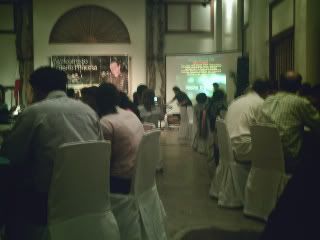
And we stayed in a really nice hotel , the Asturias Hotel.

It has dimly lit twin-bed rooms fit for some rest and relaxation after a hard day's work.


Inside is a small interior garden.

And a nifty swimming pool. Unfortunately, it is built for relaxation and not for water exercises.

The lobby is as dimly lit as the rooms but is also comfortable.

Here's a picture of me in front of the hotel. Hehehe :)
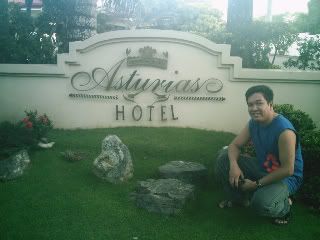
The place looks as lovely at night as it does during the day.

Lights in front of the Puerto Princesa Cultural Center.

Another view of the plaza lights.
And to cap the opening ceremonies of the Palaro, we watched young students compete for the title of Mr. and Ms. Palaro.

The young Cebuana lass in green dress won the title of Ms. Palaro.
And here is a little something to do: Find the fighter plane in the picture and find out how many there are. :)
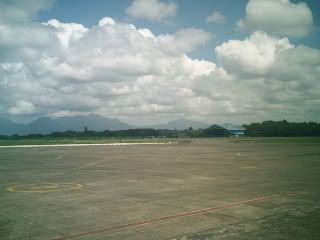
Happy hunting!
Visit Palawan one of these days. :)
Saturday, June 28, 2008
Who's poor?
Wikipedia defines poverty as "deprivation of those things that determine the quality of life, including food, clothing, shelter and safe drinking water, but also 'intangibles' such as the opportunity to learn and to enjoy the respect of fellow citizens."
On my way home from a meeting outside of the office, I saw a man watching an afternoon tv show on his free time inside the Quinta Market in Quiapo near the Pasig Ferry terminal. (see separate story in my commuter blog)
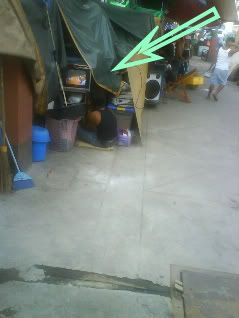
His TV set has a 15" screen and he uses a cable television line as an antenna. While he watches free TV broadcasts, his neighbors up ahead have cable TV connection and are watching the Pinoy Box Office channel.
So, if poverty is defined as deprivation of those essentials mentioned above, then I believe this man is not inside the poverty level.
But then again, there is a so called poverty threshold which measures poverty based on income levels.
So who's to say someone is poor?
Thursday, June 5, 2008
Call to enrol
Let us get our kids to school!
Call +63.2.636.1663 for details.
Visit the Oplan Balik Eskwela Information and Action Center at DepEd Complex, Meralco Avenue, Pasig City from 7:00 a.m. to 6:00 p.m. until June 13, 2008.
Or visit the public school or DepEd office nearest you.
Balik eskwela na!
VIDEO COURTESY OF BROWNSUGAR PRODUCTIONS
Sunday, June 1, 2008
Potty time: safe and secure passwords
Character wise
A safe and secure password must use letters (a-z) in both cases (a-z and A-Z) alternately, numbers (0-9) and characters (@,$,%,&, etc) in one password alone. An example is abc@123. This is a 7 character password using alphanumeric (letters and numbers) characters and a special character.
Some may write their passwords as aBc@12E. In this example, a certain letter is capitalized to break the sequential pattern (i.e. a-b-c) and a number (3) is substituted for its alphabetical equivalent (3 = e).
Numbers and letters can be substituted for each other. Here is what I have so far: 1 = i, 3 = e, 4 = h, 0 = o.
Length wise
Long passwords are hard to crack. The longer the harder. I have seen people typing in about 12 characters using the QWERTY side of the keyboard along with the number row on top (with shift pressed) and the number pad at the right side. The password must look something like this "sg85@sgh89t8"
One can memorize all the characters. But at this time, we all have more than one account that requires a password. You have your email account (personal, office, business, and monkey-business), your blog account, your photo archive account (photobucket, flicker), internet bank account, and your online community account (friendster, facebook, yahoo! 360).
Well, you can use the same password in all your accounts. The only problem is if your password in one account is discovered all your other accounts are in danger.
Variety
You can vary you password pattern in different accounts. For accounts that you think may not be that important or that you can rebuild after it is ruined, just have a simple password that you can remember and someone else can guess.
For accounts that record you personal and financial assets, transactions, and communications, have a more complicated password for them.
If your account requires you to change the password regularly, try to come up with 3 different passwords that you can easily remember. You may write it down and keep it locked away. But committing it to memory is the safest way.
Connections
Most hackers or those who are plain troublemakers will want to find a connection between you and the password. If you deeply adore your a person or even just your cat, the hacker will just try using the cat's or person's name or nickname in different variations (alpahnumeric and special character combinations, forward, backwards, reversed segments) to access you account.
One way to avoid this problem but still retain a good chance of remembering the password is by connecting the password with someone or something that you used to know or have but is not in any way connected with you anymore.
An example will be a nickname you gave your toy when you were a child that nobody else outside your family knows about. Or the name or nickname of the person you used to plan in having a relationship then but did not bloom. Or the birthday of a person you have a crush with 10 years ago.
I hope this will help you make your accounts more secure. Happy computing!
Monday, April 14, 2008
Koronadal formerly Marbel
Koronadal is a city in South Cotabato. It was named as such because it used to be a field of tall grass called koron. Now, it looks more like a field of pineapples.

Koronadal has wide fields of pineapples. These fields are owned or leased by Dole Philippines. And Dole makes the best pineapple products I have tried. They have even ventured into making peaches preserved in syrup.
When we were there, we stayed in an inland resort called the Farm.
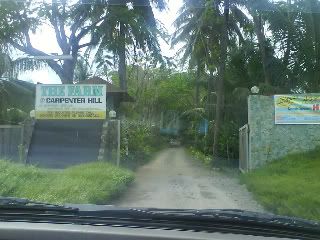
The Farm has several function areas for big and small groups.
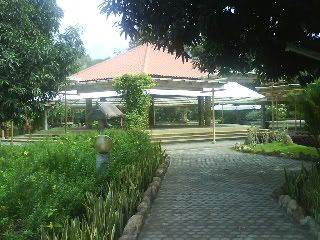


And aside from their dorms they have a row of villas for more private and relaxed stay.



It is a single bedroom unit with a queen sized bed, toilet and bath and amenities of a hotel in a small bungalow.
I had a relaxed stay in spite of our hectic and sweaty schedule.
You should try it too. :)
Saturday, April 12, 2008
Press release - Bicol rehab to complete soon
The Department of Education reports a 98 percent actual physical accomplishment in the construction and repair of school buildings under the Bicol Calamity Assistance and Rehabilitation Efforts (BCARE).
“We have informed President Gloria Macapagal Arroyo that of all government agencies in Bicol, DepEd is the first among BCARE agencies to complete its rehabilitation targets,” said BCARE Commission Executive Director Dr Anthony Golez during the last inter-agency coordinating meeting last January 17 at Camp Aguinaldo.
BCARE has identified 2,220 school sites where some 771 new classrooms are up for construction and 7,142 are for repairs.
Figures from DepEd's Physical Facilities and Schools Engineering Division (PFSED) showed that as of January 7, 2008, classroom construction and repair are proceeding at a steady pace with all provinces reaching almost 100-percent completion in the repair and construction of new school buildings.
DepEd is still short of full accomplishment. Specifically, in the case of Maipon Elementary School whose buildings were completely covered by mud, the entire school needs to be relocated to another site. A few other schools are yet to complete construction due to its isolated locations that limit delivery of construction materials. These schools are either located on separate islands or in remote areas no easily accessible to vehicular traffic.
Under BCARE, DepEd has earmarked some P1.2 billion for the construction of new classrooms and repair of damaged ones in Albay, Camarines Sur, Camarines Norte, Catanduanes, Masbate and Sorsogon.
BCARE is similar to a mini-Marshall plan specifically put up to rehabilitate Bicol after suffering the brunt of the succession of super typhoons in 2006. The effort of the United States to rebuild and strengthen allied countries in Europe after World War II was called the Marshall Plan, named after then Secretary of State George Marshall.
DepEd also constructed 15 typhoon-resistant school buildings in Camarines Sur, Legaspi City, and Albay. Six more buildings of this type are being put up around Bicol with funding from the United Nations Children Emergency Fund (UNICEF). Another six will be constructed in Region 4-B MIMAROPA also through UNICEF.
This new type of school building doubles as academic classroom and evacuation center. It is made of concrete and steel and elevated one meter above the ground.
Saturday, April 5, 2008
Smoke in your face
Scooters are cheap, easy to maintain, and can get you around even in the heaviest of vehicle traffic.
Scooters first came out with their original "kit" design.
Improvements came through paint colors and paint styles. Then came the stickers and logos and artworks on the motorbikes.
After that, flashy lights were introduced. Lights of different colors and intensities "create" and "image" for the bike.
And then there came sound systems. Boom boxes on wheels playing gangsta and punk via a portable CD player.
To further pimp their ride, custom hoods, seats, and tail pipes came.
There are tailpipes that are as big as those of big bikes. And there are those that are designed to make sound like a high speed Ferrari.
And last, but not the least, tailpipes that are angled upward so that the blast of its exhaust slaps you in the face. And this is annoying.
Why does the Land Transportation Franchising Board (LTFRB) not take notice of this? Can't anyone provide high angle and low angle limits for the tailpipe's tilt?
When scooters blast exhaust of my face, I really get irritated. How I wish I can break that tailpipe into two to teach the rider a lesson about being considerate.
Wednesday, April 2, 2008
Alien engineering part 3
Credit goes to Danni4815162342
It is heart-stopping.
Wednesday, March 19, 2008
Traffic management
Saint Paul Drive is a road in Pasig City that is commonly used by drivers going from C-5 to Meralco Avenue. Traffic in this road gets heavy during school days. It is specially heavy early in the morning when students are dropped off by their parents, at noon when primary school pupils are picked up, and in the afternoon when the rest are picked up.
This is usually managed by making the traffic flow in one direction only. And it works.
Unfortunately, the four-lane road gets obstructed just before the entrance gate up to the exit gate. It is in that area where private vehicles collect before entering the gate and where they spread out when they exit.
I thought that to better manage the flow of traffic and allow those just passing by to go through the area without hindrance, the four lanes must be divided.
The two lanes right beside the school perimeter can be used for the qeueu of parents of Paulinians. And the far lanes be kept open for non-Paulinians who just want to get through to Meralco and on to Megamall.
However, some of the more rich and spoiled parents want to do things their way and it jams the flow.
It is early in the morning and heads get hot due to the jam. Well, leave it to the rich to get the roads filled. :)
Monday, March 17, 2008
Travel time - Vacation venues
1. Time to report to the office
2. Where to stay during vacation
FX is a model of the Toyota Tamaraw Asian utility vehicle (AUV) primarily used as a public utility vehicle (PUV) due to its large capacity. It comes between the regular jeepney and the taxi cab.
Reporting time
It is common that people who know each other are interested in the times they get to work. This discussion usually start discussions covering other topics.
This topic is also a form of assurance for some that they are not the only ones who are late for work.
Vacation
As vacation looms, where a person spends that time forms another topic. People compare notes on their planned vacations. They talk about where to stay, what to do, and sometimes how much it costs.
Today, the other passenger will be spending his vacation in the house of one of his buddies. His buddy will be alone this Holy Week and he welcomes the company. He will spend it there with his other buddies and they will probably drink themselves to exhaustion during the four days they will be together.
Sunday, March 16, 2008
Religion - Palm Sunday
The priest instead read the letter from Cardinal Rosales of Manila. I was expecting it to contain anti-government statements or pro-government ones. But I heard none of those.
The homily centered on the need for our willingness to go through "the desert of change." It asks each and every Catholic to recognize our wrong-doings, commit oursleves to correct them, and vow never to do the same again.
Rather than calling for change in leadership or express support for it, the letter instead appealed for change. Change in our hearts. Change in our lives.
The letter pointed out the corruption and abuses that plaqued our country. A plaque that once was and is still considered as a cancer of society. Corruption is seen not just as an ill in the government but that of the society as well.
In the movie Evan Almighty God, played by Morgan Freeman, asked Evan to build an ark for a great flood is soon to come. As Evan struggled with himself, his work as a Congressman, and as a family man, tools and lumber were delivered to him.
The flood did came but it was not the same flood that wiped the world clean during biblical times. It was a sudden rush of water when a dam, whose construction was substandard due to corruption, ruptured.
In the end, what was emphasized in the film is not doing great things but a simple act of random kindness at a time.
Cardinal Rosales and the bishops of Manila call on all Filipinos to make some changes in themselves. One simple change done altogether a day at a time is one great step toward a better future.
Alien engineering part 2
Credit goes to RunzWithScissorz
Science and science fiction. Can there be a union between the two?
Tuesday, March 11, 2008
Travel time - what do jeepney drivers know
While I was whiling away my time for the more or less 30-minute ride, I heard the driver and his buddy talk. The topics were as follows:
1. Transport strike
2. Economy in Mainland China and its effect of the Chinese
3. "Buddy's" trip in the morning.
1. Transport strike
They discussed that the transport strike was effective. The strike was organized to voice out their frustration at the multiple ticketing scheme being used, particularly in the metropolis (Manila).
Both agreed that the strike was successful and that with a small sacrifice, they can have their resentments heard. On another note, they talked about the village patrol car that volunteered to ferry passengers still stranded that evening.
2. Economy in Mainland China and its effect of the Chinese
During the course of their discussions, they changed their topic to the effect of the economy in Mainland China on the Chinese.
"Buddy" told the driver that Chinese economic policies have severe effect on the Chinese. Because of this, those Chinese who can afford opt to leave the country and settle somewhere else. They also noted that most Filipino-Chinese own a successful business here in the Philippines.
Driver narrated that the Chinoys owe their success to the support of other Chinoys. He said that they help out each other in times of need. An example, he said, is when a Chinoy businessman goes bankrupt, other Chinoys help out so he can start over. But there is a limit to this help, he adds. He even said, "See-ke, ee-kao ak-yen too-long. Pe-lo pak ee-kaw loo-ke pa oo-let, aa-koo wa-la na ma-ka-wa."
3. "Buddy's" trip in the morning.
"Buddy" told the driver how happy he was with his trip that morning. He said that the traffic was so light and the passengers are overflowing. He added that he can do just two trips and his income will be fine for the day.
Well, until next trip.
Saturday, March 8, 2008
When it comes to fame, education goes out the window
For the most part of the week teachers organizations, religious groups, and private organizations complained about DepEd banning Mr. Lozada from visiting schools. This weekend, it's the turn of the students to air their side.
Let us make a few things clear:
1. In an order published by DepEd, no word that means ban (forbid, outlaw, prohibit, veto, bar, proscribe, disallow, interdict - courtesy of Microsoft Word Thesaurus) is written.
2. There is absolutely no Rodolfo, Jun, or Lozada in that order.
3. The order was published even before Lozada organized his school tours.
4. DepEd is mandated to provide basic (elementary and high school) education.
5. The order covers graduation ceremonies of elementary and secondary schools only.
You wait for six or four years to finish school and look forward to a good advice on how to survice high school or what course to take in college. Then come graduation day, all you hear is the political scene of the country.
The bone of contention, I believe, is paragraph 3 of the order that reads "The graduation rites should be conducted in an appropriate solemn ceremony befitting the graduating students and their parents and shall not in any way be used as a venue for political forum." But still, there is no mention of Mr. Lozada there.
Yet they keep on saying that DepEd is banning Mr. Lozada. Now, they even say that DepEd backtracked it's "ban" when no ban was ever made.
These people are educated.
These people are in or has finished college.
And yet they forgot that they used to do research first before they went to class and delivered their report.
And this bothers me.
Is it because they just want their faces shown on television? Or their voices heard on the radio? Or their names printed on paper or posted on the web?
Why don't we celebrate the fulfillment of our years of work first, and talk politics later?
What do you think?
Sunday, February 17, 2008
Alien engineering part 1
This is very informative, the analysis based on scientific facts as described by guest scientists (I am not sure though if they are really scientists but why spoil all the fun).
Here is the first installment:
Monday, February 11, 2008
Traffic woes: the pedestrian crossing
With my limited knowledge of traffic signs, I know that straight lines on the road mean that vehicles must remain on their side of the road for the entire length of that line and broken lines mean they can go from one side of the lane to the other cautiously.
Applying this principle in pedestrian lanes, I surmise that the two solid lines on either side of the pedestrian lane means vehicles must stop for pedestrians.
Alas, it does not hold true.
In the pedestrian lane that I and other people take to get to the jeepney stop, it is the pedestrians who must give way to the vehicles. While some drivers do stop to let pedestrians cross, most do not.
Is is because the drivers believe that they have the right of way because they are enclosed in a metal shell running at 20 kilometers an hour and we are not?
Is it because nobody has been seriously convicted of reckless driving resulting to severe physical injuries? In fairness to the authorities, some have. Except that those convicted are the poor careless-drivers-trying-to-making-ends-meet while the rich ones with fancy cars and next-to-nothing-road-safety-seminar-compliance get off the hook.
Or is it because licensing in this country is so easy? To get a license in our poor suffering country, all you got to do is pay up extra to take a written exam using an already-answered-test paper, and drive a car forward and backward.
Lots of new cars flood into this country. We do not only lack roads to accommodate all these vehicles, we also lack drivers who know how to use those roads.
Sunday, February 10, 2008
Sony Ericsson K610i - night mode
Some of its features are:
- 2-megapixel camera for photos and videos
- secondary VGA camera for video calls
- MP3 player
- 3GP player
- Usual calendar, alarm, to-do, etc
- SMS, MMS
- Bluetooth
- WAP, GPRS

I took this shot without the night mode. This is a shot underneath my computer table where the shadow of the florescent lamp was covering the PC.

And I took this one with the night mode on. This photo has not been altered and it shows the original photo quality during the time it was taken.
So, if you are looking for a camera phone, Sony Ericsson, I believe, is the choice. :)
Sunday, January 20, 2008
Linux how to: audio in multi-user PC
Under my Linux OS, I have created two user accounts, mine and my wife's. My account has been created during installation. But this account is does not have administrative rights. My wife's account, however, was created long after the installation is made. I will discuss this process some other time.
When I created her account and tested if the account is okay, I noticed that the audio functions of the PC does not work for her. Accidentally, while I was configuring user rights to my mySQL application (also under linux) I was able to figure out how to allow her to use the speakers.
Under Linux, a user has to belong to certain groups to be able to fully use the machine. And only root can provide such a privilege.
So:
1. Open a terminal program
2. Log on as root by typing 'su' or super user in the terminal window and ender the root password.
3. Check to which group the user belongs to (the 'user' here refers to the user you wish to allow additional privileges, in my case my wife) by typing 'id' space and the user name. The result will be something like this:
uid=1000(username) gid=100(users) groups=100(users)
4. List down the information under "groups."
5. To allow the user to have audio rights, type the following:
usermod -G users,audio (username)
*remember to include the group of the user that is shown after typing 'id (username)' because if not, the original user rights to that user is lost and replaced by whatever you typed in after '-G'
When I checked, she now has audio rights and can listen to any music available that she wants to play.
Hope this helps.
